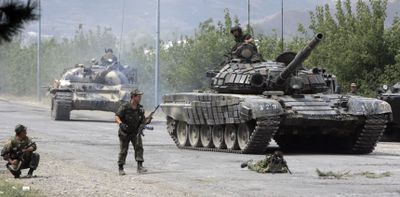U.S. won’t send troops to Georgia

WASHINGTON – American officials on Thursday ended speculation that the U.S. military might come to the rescue of Georgia’s beleaguered government, confirming Russia’s virtual takeover of the former Soviet republic and heralding Moscow’s re-emergence as the dominant power in Eastern Europe.
“I don’t see any prospect for the use of military force by the United States in this situation. Is that clear enough?” Secretary of Defense Robert Gates told reporters in his first public comments since the crisis began Aug. 7.
“The empire strikes back,” said Ariel Cohen, a Russian expert at the Heritage Foundation, a conservative policy institute in Washington, D.C.
Gates’ comments came just 24 hours after President Bush dramatically announced in a televised White House appearance that American military aircraft and ships would be dispatched to carry humanitarian aid to Georgia and that the U.S. was expecting unfettered access to Georgia’s ports and airports.
But Bush apparently had spoken out of turn, before Turkey, which by treaty controls access to the Black Sea, had agreed to permit U.S. naval vessels to sail from the Mediterranean to the Black Sea, and on Thursday, Pentagon officials said they doubted that any U.S. naval vessels would be dispatched.
In Georgia, Russian troops held their positions in Gori, refusing passage to anyone attempting to travel west or north from the strategic central Georgian city. Occasional explosions could be heard, apparently from mortar rounds, but there was no open fighting between the Russians and bedraggled Georgian soldiers, who sat in trucks waiting for Russian permission to re-enter the city.
Russian officers joked that they could race to Tbilisi, the Georgian capital, 40 miles away, if they wished, but said they’d been given no such order.
In Moscow, Russian Foreign Minister Sergey Lavrov rejected any references to preserving Georgia’s “territorial integrity,” and the deputy chief of staff of the Russian military said “there would be a change of geography” involving Poti, Georgia’s primary port on the Black Sea.
The developments alarmed some experts, who warned that the Kremlin appears intent on restoring the regional dominance it exerted during the Soviet era and might be attempting to seize de facto control over Georgia and a vital oil pipeline from the Caspian Sea to Western Europe.
Gates, who for years was one of the CIA’s top Soviet analysts, said he believed that Russia’s movement in Georgia is part of an effort by Russian leaders to “reassert their international status.”
Many Georgians interviewed Thursday said they saw American intervention as their sole remaining chance to avoid Russian domination. They spoke of the United States with an admiration rarely heard in many parts of the world; several pleaded with a McClatchy reporter to tell them when help was coming.
With the Georgian army defeated, the reports of an American aid shipment to Georgia sparked hopes that the U.S. military might follow.
Standing at a police checkpoint between Tbilisi and the city of Gori, Vakhtang Golinjashvili said that his village had been attacked by Russian troops. The checkpoint was surrounded by a throng of Georgian refugees, most of them walking toward Tbilisi with sacks of their belongings.
“The only way out is the help of America,” Golinjashvili said.
Standing next to him, Iveri Nezvrishvili agreed.
“The Russians want to destroy us,” he said. “The only things we can rely on are God and the Americans.”
James F. Collins, a former U.S. ambassador to Moscow who’s currently a senior associate for the Carnegie Endowment for International Peace, said he doesn’t believe that Russia wants to rebuild the Soviet Union. But he said the Kremlin is “clearly sending a message” to the United States and other Western countries that Russia dominates the region.
The fate of Georgia’s pro-Western government and its U.S.-educated president, Mikhail Saakashvili, remained the subject of speculation.
American officials have accused Moscow of waging the war in part to force Saakashvili out of office. Saakashvili, a one-time Washington lawyer, has been a source of deep irritation for the Kremlin as he pushed for Georgia’s membership to the North Atlantic Treaty Organization.
The Russians have made no overt moves to remove Saakashvili. But Russian troops have staged nightly drives toward Tbilisi that have fueled fears that the capital would fall. Those maneuvers, some in the Georgian capital say, could be designed to undermine the public’s belief that Saakashvili is in control of his country.
The United States is trying to strike a delicate balance, supporting its Georgian allies without aggravating already fragile U.S.-Russian relations. Gates said Thursday that the United States doesn’t want to restart the Cold War conflict between the two countries.
“I think we have been frankly pretty restrained in this,” he said.
Instead, the U.S. focus remains humanitarian, Gates said, noting that the second of two C-17 cargo planes carrying sleeping bags, medical supplies, cots and blankets arrived in Tbilisi on Thursday morning. A 12-member assessment team is also in Georgia to determine how much more aid that nation needs.
While the defense secretary and the Pentagon have tried to defuse the situation, Gates said that if Russia doesn’t pull its troops back from Georgia, it could hurt Moscow-Washington relations “for years to come.”